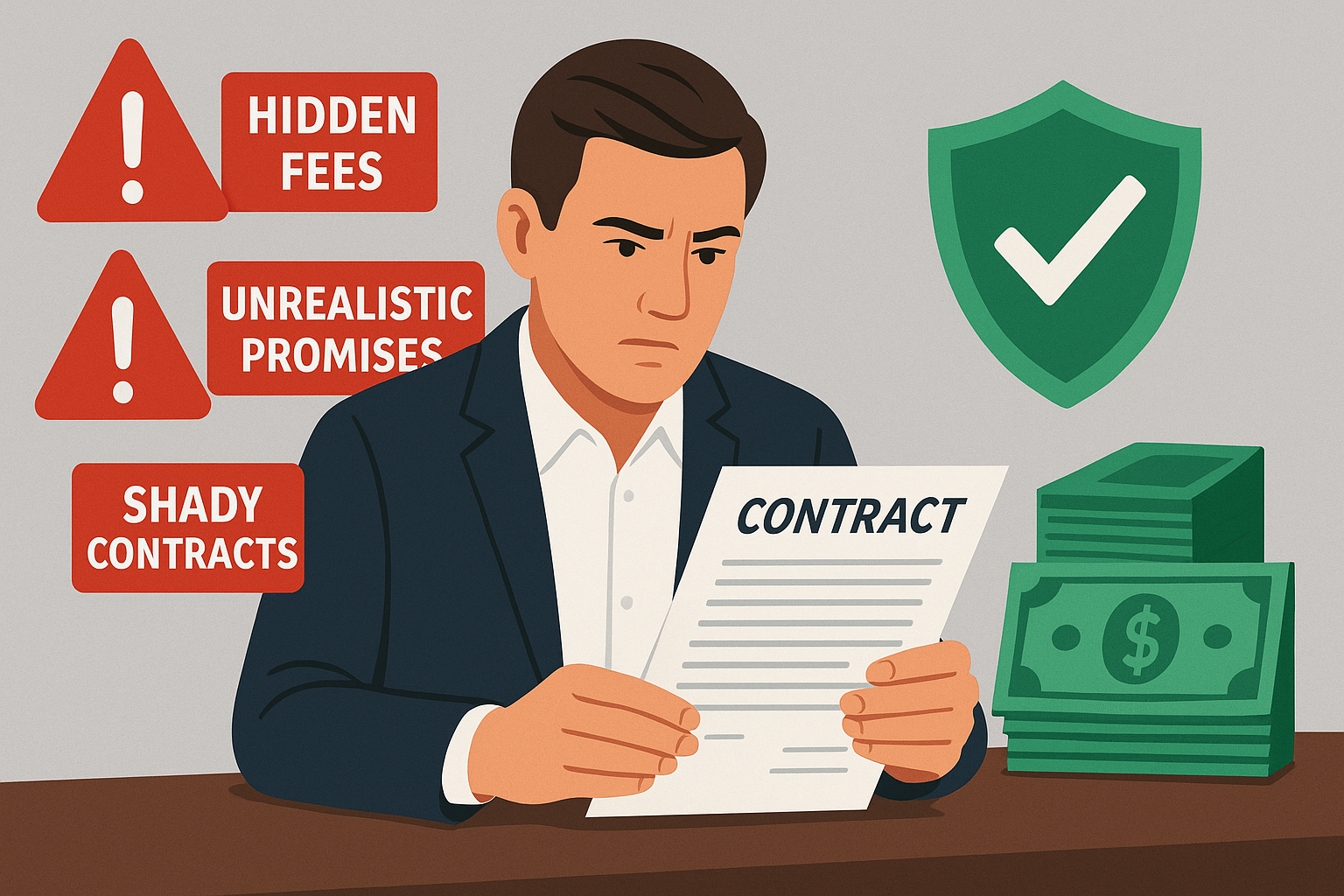Selling structured settlement payments can be a smart financial move, especially if you need a lump sum to cover unexpected expenses, medical bills, or investment opportunities. However, the process also attracts scammers and unethical buyers who prey on individuals looking for quick cash. In 2025, these scams have become more advanced, making it crucial for sellers to stay informed and cautious.

Understanding the common red flags when selling structured settlements can help protect you from fraud, hidden fees, and legal complications. A structured settlement is a valuable long-term financial asset, and losing it to a scam could put your financial future at risk.
This updated guide will walk you through the warning signs to watch out for, from too-good-to-be-true offers to shady contracts. By learning how to identify these red flags, you can ensure a safe and transparent selling experience while getting the most value from your settlement.
1. Unrealistic Offers That Sound Too Good to Be True
One of the biggest red flags is when a buyer promises a payout far above the market average. Scammers know that high offers attract desperate sellers.
Why It’s a Problem:
- These offers often collapse later, leaving you with less money than expected.
- Fraudsters may use inflated offers to secure your signature and then change the terms.
What You Should Do:
- Compare multiple quotes from reputable companies.
- Be cautious if one offer is much higher than others—it’s likely a trap.
2. Upfront Fees and Hidden Charges
Legitimate structured settlement buyers do not require upfront payments. Scammers, however, may request “processing fees,” “application costs,” or “legal charges” before the sale is finalized.
Why It’s a Problem:
- These fees disappear with the scammer.
- Even if the deal goes through, hidden charges reduce your payout.
What You Should Do:
- Never pay upfront fees.
- Ensure all deductions are clearly listed in the final contract.
3. No Court Approval Process
By law, selling structured settlement payments requires court approval. If a company tells you it can bypass this process, it’s a clear scam.
Why It’s a Problem:
- Deals without court approval are illegal.
- You may lose legal protection and your right to payments.
What You Should Do:
- Always insist on court approval.
- Walk away from any buyer offering “shortcuts.”
4. Vague or Complex Contracts
Fraudulent buyers often hide harmful terms in complicated legal documents. Some contracts may lack key details or be designed to confuse you.
Why It’s a Problem:
- You may unknowingly agree to unfavorable terms.
- Loopholes can allow the buyer to reduce your payout.
What You Should Do:
- Hire a financial advisor or attorney to review contracts.
- Never sign documents you don’t fully understand.
5. Pressure Tactics and Urgent Deadlines
Scammers often pressure sellers with phrases like “You must sign today” or “This offer expires in 24 hours.”
Why It’s a Problem:
- Rushed decisions prevent proper research.
- Legitimate companies allow time for review and questions.
What You Should Do:
- Take your time—structured settlement sales should never be rushed.
- Get multiple offers before committing.
6. No Verifiable Business Information
Some fake buyers operate without real offices, licenses, or track records. Their websites may look professional but provide little substance.
Why It’s a Problem:
- Without business credentials, you risk losing your money.
- Scam companies can disappear overnight.
What You Should Do:
- Verify licensing with state authorities.
- Check BBB ratings, online reviews, and complaint histories.
7. Fake Reviews and Testimonials
Fraudulent companies create glowing reviews to appear trustworthy. These may be copied, generic, or suspiciously similar.
Why It’s a Problem:
- Misleading reviews create false credibility.
- Victims are more likely to fall for the scam.
What You Should Do:
- Look for detailed reviews with verified clients.
- Be wary of companies with only perfect ratings.
8. Poor Communication and Lack of Transparency
If a buyer avoids calls, uses generic emails, or refuses to share key details, it’s a red flag.
Why It’s a Problem:
- Lack of communication signals unprofessionalism or fraud.
- You won’t get the transparency needed for a safe deal.
What You Should Do:
- Demand direct communication with a representative.
- Verify office addresses and contact details.
9. Promises of Fast Cash with No Details
Fraudsters may claim “instant cash payouts” without explaining the process. Selling a settlement legally takes time due to court approval.
Why It’s a Problem:
- Instant payouts are unrealistic and usually fraudulent.
- Rushing could mean signing away your rights.
What You Should Do:
- Expect the process to take weeks or months.
- Avoid companies promising overnight payments.
Selling a structured settlement can provide much-needed financial freedom, but only if you navigate the process safely. In 2025, scammers are more creative and aggressive than ever, using fake websites, inflated offers, and pressure tactics to steal from vulnerable sellers.
The red flags are clear: unrealistic offers, upfront fees, missing court approval, vague contracts, pressure tactics, and fake reviews. By recognizing these warning signs, you can protect your settlement from fraud and secure a fair deal.
Always take your time, verify business credentials, and consult a legal or financial expert before signing any agreement. A structured settlement represents long-term security, and protecting it is worth the effort.
When selling your payments, remember this: if it sounds too good to be true, it probably is. Stay cautious, stay informed, and safeguard your financial future.